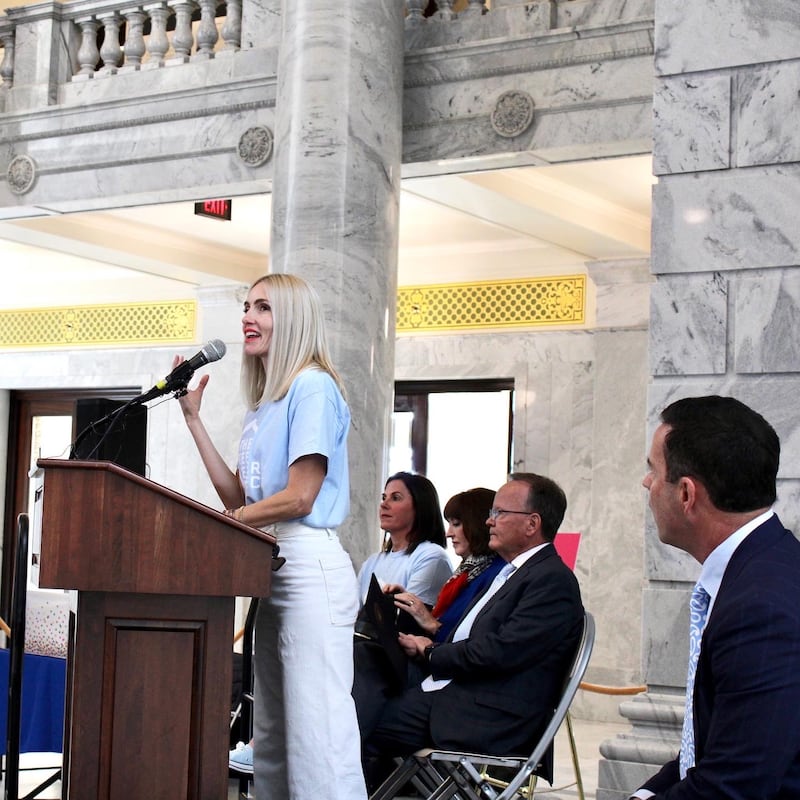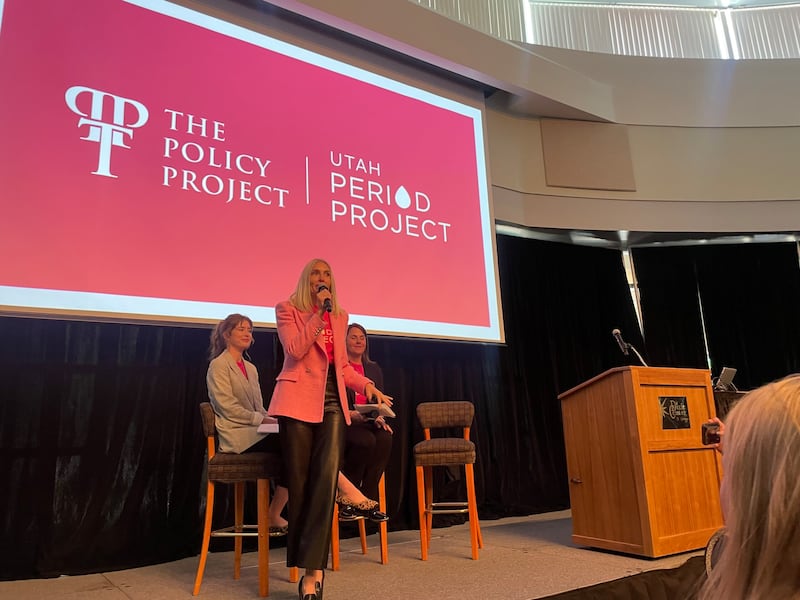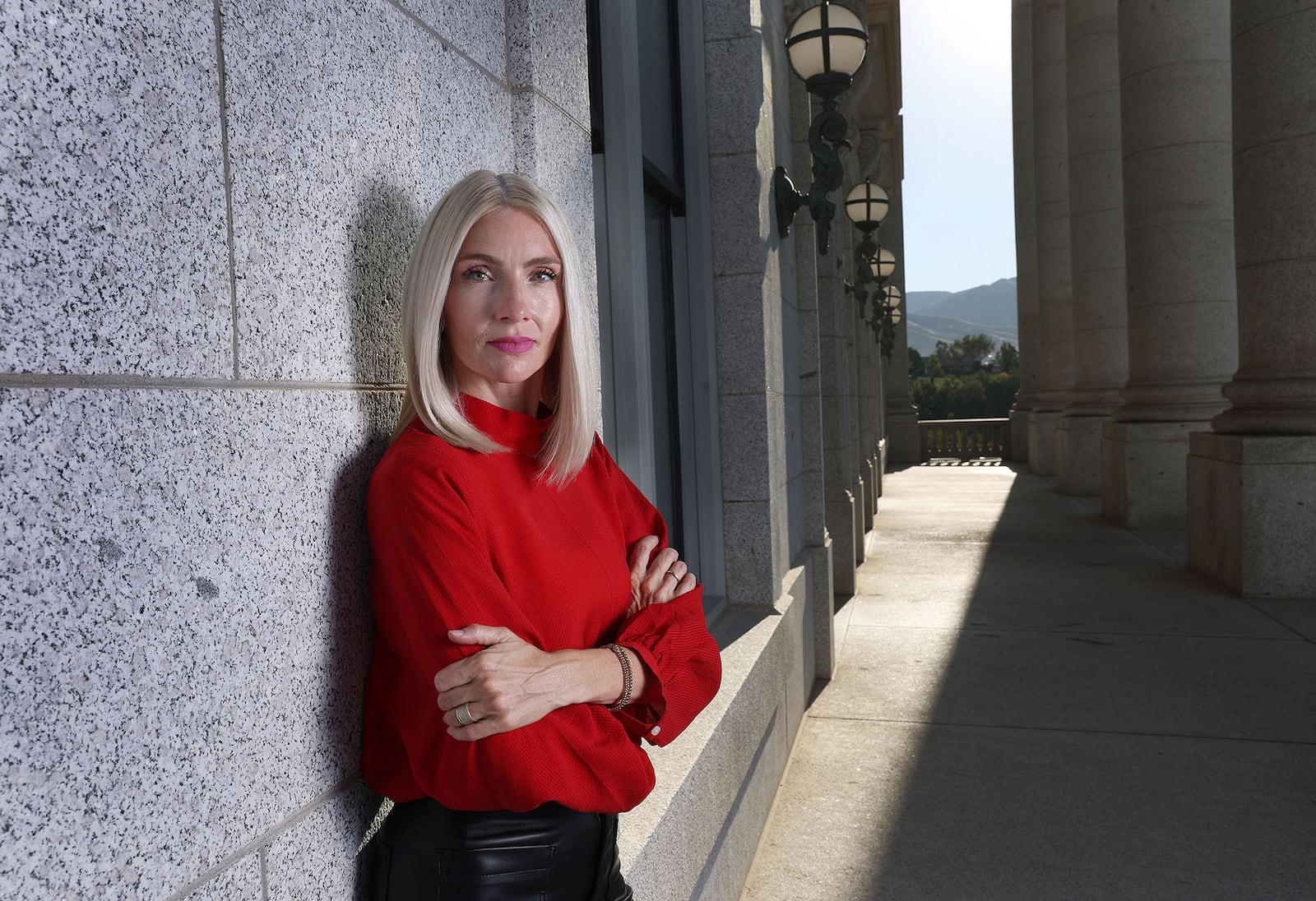Iwas born into a safe, loving world, one well-curated for the raising of children. My parents lived in a well-resourced suburb just south of Salt Lake City in a religious home and community. My mother cared for the home and raised children full-time while my father spent his days building a residential real estate agency.
When I was nine, my mother was diagnosed with a brain tumor. Knowing nothing of the delicacy of that organ, I remember crying, sitting at the end of my mother’s hospital bed pre-surgery as neurosurgeons proclaimed that my mother’s personality might change a little. As a child, to me, that meant she’d like Laffy Taffy instead of M&Ms and red instead of pink.
The reality was different. After multiple surgeries and the loss of part of her brain (craniectomy), she became incapacitated, irrational and bedridden. The days of caretaking—making dinner, grocery shopping, mothering—were over. And with mounting medical bills, my quiet and strong self-employed dad worked nonstop.
I ended up “raising” my younger siblings. I prepared dinners of Skittles and fat-free Entenmann’s cakes coupled with an occasional box of Cap’n Crunch. Luckily, loving grandparents, neighbors and other family and church members stepped in when they could to bring a meal, run a load of laundry or even weed flower beds on occasion.
Our life was palatable chaos. Homes with four children and little parental oversight don’t stay clean for long, and I grew increasingly embarrassed by the mess. My mother’s lack of ability to reason and function made me resent my life—I hadn’t had the chance to develop skills, like dance or soccer, that I saw other kids around me developing.
As I age, I see that my ability to overcome was largely due to circumstances way beyond my control. Had we been in a different financial position, lived in a different community or not had family close, I could have very easily gotten lost in my story. But I was not lost. My parents loved me, and the many layers of foundational safety nets created an environment that enabled me, if I chose, to eventually thrive. Still, I knew that defining my life and striving for what I wanted rested squarely on my shoulders.
Leaving the nest
As my high school graduation approached, I could see for the first time that there might be life beyond the walls of my home. I broke from family tradition (go Utes) and moved 45 minutes south to attend Brigham Young University (BYU). I was tormented by the decision to move out. My siblings were still young, but my dad encouraged me, and it felt like it was time to go.
I felt very drawn to political science, but nothing in my life experience had proven that there was a career path there, and everything in my life experience had proven that I most definitely needed a job. I landed on broadcast journalism.
I settled into college life. Lots of crushes, saltines with honey on them for dinner, and lots and lots of studying. In my sophomore year, I studied abroad in France—a tribute to a long line of Francophiles on my mother’s side.
Fittingly, my mom passed away while I was there. There was no obvious warning or sign that she’d die at that time. She was having another brain surgery, but she’d had three in the past and lived for nine years, so this new surgery didn’t seem like a spectacular event. But it turns out death decides. We don’t.
It was 1999, and my last conversation with my mom was five days before she died. It was her birthday, so I called home from my apartment in Nice. It was a call with a lot of 19-year-old eye-rolling on my part. I remember her saying, “I’m going to be your guardian angel when I die.” And, “You need to marry [insert boyfriend’s name at the time] because he’ll take care of you while you’re out saving the world.”
My response was, “You’re fine, mom, you’re not going to die.” As for the part about saving the world, I had done no such thing and had no plans to do any such thing. But as it turns out, eye rolls are no match for the knowing insight of a mother who still ultimately loves and knows her children.
Why not me?
I married Adam McCormick, an incredibly kind and hardworking mower of lawns, a month after graduating from BYU. I took a temporary job writing a policies and procedures manual for a self-storage company. That eventually turned into a full-time job as an administrative assistant, which was probably healthy for my pride. I eventually worked my way into a job at an advertising agency in town and was much happier.
Two years after marriage, I attended graduate school at The Ohio State University at the same time my husband was in dental school. After finishing my master’s degree, I worked in public relations and marketing for several design and advertising agencies before co-founding an apparel company, Shabby Apple. The launch of Shabby came from what I saw as an obvious need in the marketplace: dresses that were fashionable, reasonably priced, and that fit the specific women’s apparel standards of The Church of Jesus Christ of Latter-day Saints.

During those years, we moved to Richmond, Virginia. With a husband in residency, me running a quickly-growing company and three kids under age four, I was diagnosed with a pregnancy-induced life-threatening heart condition that would take two years of recovery if I landed on the lucky side of statistics.
I loved my work to my depths, but having a mother die young convinced me that this may be my time. I knew if I was going to die, I couldn’t leave my kids and not be more present with them. I sold my half of Shabby Apple.
Adoption as an awakening
We moved to the Washington, D.C., area for Adam’s first job as a surgeon. As my health normalized, I began consulting in strategic communication. A year later, we moved back to Utah to be close to family. We adopted two children in as quick succession as the system would allow, which ended up being six weeks.
Adoption was an awakening for me. I got to know the women carrying our children, the families they came from, the jobs and education they’d attained, and the life circumstances that had ultimately influenced their decision to place their beloved babies for adoption.
I remember sitting with both of these women, understanding that the difference between them being in a position to place their children and me being in a position to adopt those children was the smallest twist of fate. The place we were born, the race we were born and the families to which we were born. Had those things been three degrees to the right or left, I could have been placing my baby.
My two youngest children are Black. I was already very much interested in the Black American experience before adopting, but having it close made me much more aware of the historical context and what life might be like in some Black American communities.
My natural interest and passion seemed to always direct me to books, media and conversations about what life is like in contexts far from my own. Books like “Sex and World Peace,” “Heartland,” “A Long Walk to Freedom,” “World Order” and “Just Mercy” had the ability to take me to places and spaces to which I did not have an entry.
As my husband’s career stabilized, I knew I had to do something to impact the world for the better, but I didn’t have an interest in fixing problems that existed in the lives of the people with whom I worked. I wanted to stop those problems from ever happening (e.g., how do you keep a person from becoming homeless so that meal is unnecessary?). I wanted to do it at a large enough scale that the impact could actually shift society in a lifetime.
It ‘has’ to be me
In the summer of 2018, I met a friend for lunch. She was working on a concept that was new to me: getting period products to girls and women in very low-income countries where they weren’t able to go to school or work because they did not have access to pads or tampons.
I was shocked by stories of girls being physically punished for bleeding on benches at school, shamed for dirtying their clothes or forced into sexual transactions to receive period products. I knew I had to help, but with five still-young children, an international job was undoable.
At that lunch, I promised I’d look into the United States’ policies around menstruation to see if any discrepancies existed. It was an easy promise to make, as I was fairly confident the U.S. was perfect—I hadn’t wanted a pad or tampon a day in my life. I was wrong. The U.S. had no specific policies around menstruation or period products; none. By default, they are taxed while most other medically necessary products are not.
The statistics bore up the issue: Eight out of 10 girls in the U.S. had missed school or knew someone who had because they didn’t have period products. One in four teens could not afford period products at all. Women in poverty chose monthly between purchasing period products or purchasing food. As a mother, I know what choice I would make.
A defining vision
Our family visited South Africa in February of 2019, where my father and stepmother were serving a two-year mission for the Church. It was a country that, just 30 years prior, had been under South Africa’s system of governance that forced extreme racial segregation and dramatically altered education for a huge population—ultimately creating a society where 10 percent of people owned 90 percent of the wealth, and 90 percent of the population owned 10 percent of the wealth. With that came horrifying differentials in education, access to opportunity and more.While there, we visited an apartheid museum, which shifted my mindset forever. Of the experience, I wrote this:

“Buried yards into zigzagged cement walkways, artifacts, photos and documents, is a wall. A wall that stands stories high, vastly wide. Red and brown brick, covered almost entirely by hundreds of small black plaques, each engraved with white letters. It’s a wall that could be missed, immense as it is, but blended amidst the thronging displays. Upon examination, the sea of plaques takes form—each containing an ‘act’ or law.”
This wall, and each plaque on it, represents the formation and continuation of apartheid. One small “act” at a time and, thereby, one country’s 300-year history of institutionalized racism and the almost-complete destruction of a way of life for 90 percent of the population. This destruction had not been caused by wars but by ideas. Ideas that became words—words that became policies, policies that became laws, and laws that undid lives.
This wall became a vision. The vision was that policy was the answer to the questions of prevention and scale that had plagued me. It’s the tool that impacts people super wide and super fast. That was the birth of The Policy Project.
The Policy Project
I came back to the States and wrote my manifesto. From that point in 2019, I started building The Policy Project and taking on the “tampon tax.” Because this world was new to me, I did the only thing I knew how to do: I “launched.” I lunched with lobbyists and legislators, community organizers and friends. I even went to D.C. and met with all of my representatives.
The general reaction? Shock. Either shock that periods were a problem in the U.S. or shock that I was actually talking about periods over lunch. I remember one meeting in particular with a legislator where I was explaining how access to period products was a complete necessity—like that of toilet paper—but even more so because you can’t “hold” periods. He expressed a little skepticism. Becoming mildly frustrated, I proclaimed, “So if I started my period right now, on your couch that I’m sitting on, I would stand up and it would be a mess.” Nothing left to add, that legislator was all-in on periods. He became an incredible ally.
The tampon tax
At the end of 2019, we passed the tampon tax, strategizing that it would fare better as part of a larger tax reform bill. It was no small task and required creating community partnerships, writing op-eds, meeting with legislators, creating collateral and rallying at the capitol, to name a few things.
About six weeks after the bill passed, it was overturned due to a popular referendum in opposition to the food tax that was also part of the reform bill. I was pretty devastated. That legislative session, I went dark. The following year in 2021, I rallied. I worked with a legislator and tried to pass a standalone bill to end the tampon tax. After securing the House, the Senate refused to pass it. It was dead.
I was exhausted. As what felt like the final effort, I threw out the idea of putting period products in schools. I knew that, with the higher price tag and requiring much more public intervention than the tampon tax, the chances were small.
But once again, I was wrong. Legislative leadership was on board. I had a year to pull together a campaign that would change public schooling for every girl in our state. I committed myself to doing it—because I had to. I happened to be the person who knew it needed to get done.
I built The Policy Project team. I looked to people who energized me and people who brought skills I did not have to the table. I brought on some of the most thoughtful, skilled, motivated and intelligent people I know.
We called the initiative The Period Project, and in the name of all periods, all girls and all women, we turned the world pink and positive. We traversed the state, expounding on the logic of period products in schools. We invited everyone. We found donors willing to participate in a public/private partnership with the state, with donors purchasing period product dispensers for every school in the state and the legislature mandating and filling those dispensers.
In, 2022 House Bill 162, Period Products in Schools, passed unanimously. That year, 337,000 girls got access to period products, and an estimated 1.3 million girls will get access to period products by 2065. It was magic.
The end (of the beginning)
The Period Project has grown to include universities, technical schools and state buildings thanks to Gov. Spencer Cox and Lt. Gov. Deidre Henderson. We recently launched a global coalition, Period Positive Workplace, to encourage businesses around the world to offer free period products to customers and employees.
We’re rewriting the narrative for the 21st-century bathroom—one in which toilet paper, hand soap, towels or a dryer, and now period products are the norm. We’re also committed to ending period poverty. And the work grows.
In 2023, we launched The Teen Center Project, an effort to put physical spaces in every high school in the state of Utah to meet the physiological and social needs (showers, laundry facilities, food, mental health, etc.) of students most in need, including the 15,600 students experiencing homelessness in the state (1 in 50 Utah students).
We procured $15M in legislative funding and $3M in private funds to create teen resource centers in 65 Utah high schools. There is much good to do.
It is my belief that policy has the power to impact everything. It is our duty to ourselves, our neighbors and our countries to ensure that equitable policy is our heritage.

